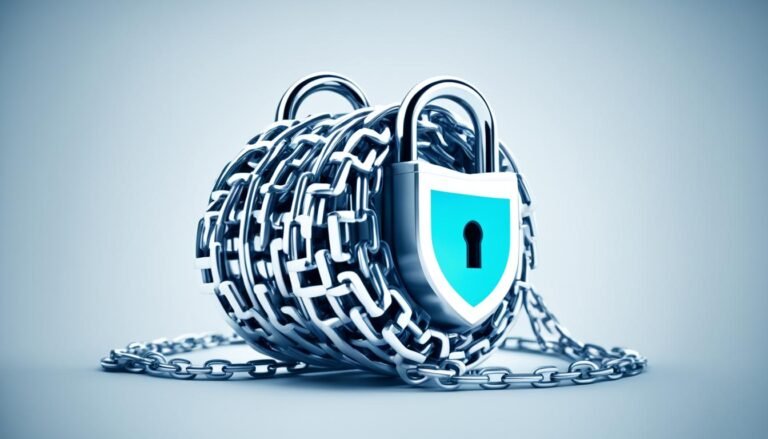Cybersecurity Regulations and Compliance in Ireland: What You Need to Know
Did you know that in 2022, cybercrime cost Ireland about €10 billion? This fact shows why businesses are working harder to protect themselves. With Ireland’s digital economy growing to $50 billion, the risk of cyberattacks is serious. More than 70% of Irish companies have faced cyber threats. This makes meeting strict cybersecurity rules crucial.
Ireland has many laws to guard against cybercrime. Some key ones are the Criminal Justice (Offences Relating to Information Systems) Act 2017 and the Data Protection Act 2018. These laws cover things like hacking, cyber sabotage, and illegal computer use. If a business doesn’t follow these laws, the consequences can be severe. They may face up to 10 years in jail and hefty fines. So, it’s very important for businesses to be ready. They should have strong cybersecurity plans and maybe even think about getting cyber insurance.
Key Takeaways
- The impact of cybercrime in Ireland reached €10 billion in 2022.
- The Criminal Justice (Offences Relating to Information Systems) Act 2017 outlines severe penalties, including up to 10 years of imprisonment and unlimited fines.
- Data Protection Act 2018 emphasizes the necessity for strong cybersecurity measures to avoid substantial fines.
- Over 70% of Irish businesses have experienced cyberattacks, highlighting the need for stringent cybersecurity compliance and possibly cyber insurance.
- Robust cybersecurity frameworks are essential for minimizing risks and ensuring compliance with Irish laws.
Overview of Cybersecurity Landscape in Ireland
Ireland’s cybersecurity scene is always changing and full of challenges. Phishing and ransomware attacks are getting more complex and affecting many organizations. It’s vital for businesses to keep up with cybersecurity updates and laws to protect their information.
Current State of Cybersecurity
In the last three years, around 46% of Irish organizations have dealt with cyber problems. Data showed that 30% of them had data breaches. Shockingly, only 14% of these incidents were reported.
Many organizations are investing in cybersecurity to prevent attacks. Still, about a quarter have no plans for updating their IT security. While 57% provide cybersecurity training, a smaller 38% use a strong, layered defense strategy.
Things get more complex as we find only 14% of Irish leaders use AI for cybersecurity. Over half of businesses were attacked last year, but 18.6% do not have a cybersecurity policy. There’s clearly a problem that needs solving.
Key Legal Frameworks
Ireland is fighting cyber threats with laws like the Criminal Justice Act 2017 and the Data Protection Act 2018. These laws make organizations boost their security and meet tough rules.
Soon, the NIS2 directive will apply to many sectors, like health and digital services. This directive will make strict rules and fines for poor security. It shows cybersecurity must be a top priority for everyone.
In the end, stopping attacks, following the law, and managing risk are all critical. Working with the NCSC and others is key to making Ireland’s cybersecurity better.
Essential Cybersecurity Regulations in Ireland
Knowing Ireland’s cybersecurity rules is key to following GDPR guidelines and keeping up with standard cybersecurity practices. Compliance checks are essential. They help organizations see if they are following the rules, find ways to get better, and stay strong against cyber dangers.
Criminal Justice (Offences Relating to Information Systems) Act 2017
The Criminal Justice (Offences Relating to Information Systems) Act 2017 is crucial in Ireland’s fight against cybercrime. It makes hacking, denial-of-service attacks, and spreading harmful software illegal. People who break these laws can face big fines or even go to prison. So, it’s important for companies to train their employees well in cybersecurity.
Data Protection Act 2018
The Data Protection Act 2018 works hand-in-hand with the Criminal Justice Act to protect people’s personal information. This law focuses on GDPR rules and making sure personal data stays safe. It’s essential for organizations to regularly check if they’re following these laws and keep their data protection strong.
Comparing the Criminal Justice Act and Data Protection Act shows Ireland’s detailed approach to cybersecurity:
| Legislation | Focus | Key Provisions | Penalties |
|---|---|---|---|
| Criminal Justice Act 2017 | Cybercrime Prevention | Unauthorized access, DoS attacks | Fines, Imprisonment |
| Data Protection Act 2018 | Personal Data Protection | Data handling, GDPR alignment | Fines, Compliance audits |
Meeting the Criminal Justice Act and Data Protection Act’s demands requires solid strategies. Regular checks, ongoing training, and strict GDPR follow-up will protect your organization. Keeping your knowledge fresh and following the latest security tips is vital for data safety in Ireland.
Understanding the NIS2 Directive
The NIS2 Directive is a big step in Ireland’s cybersecurity. It makes security rules stricter for many services that people need. This change now affects more sectors and organizations have to follow new guidelines.
Expansion of Sectors Covered
NIS2 will impact over 100,000 organizations all across the EU. From seven sectors, the coverage now includes eighteen. Areas like energy, transport, and online markets must meet these new security standards.
This broad reach is mandatory for entities with over 50 employees. Or if they have a yearly turnover of €10 million. Companies need to check their compliance through regular audits, making sure they follow NIS2 specifics.
Stricter Penalties and Reporting Requirements
NIS2 brings higher fines for not meeting its rules. Big organizations could be fined a lot if they don’t comply. They must also quickly report cyber incidents. This starts with an early warning when something goes wrong.
Doing regular drills to test their cyber readiness will help companies meet these reporting rules.
Top Management Accountability
NIS2 means top managers in key companies are directly responsible. If they don’t follow the rules, they could be in trouble. Also, authorities can do more checks to ensure companies are doing what they should.
Firms need to understand how NIS2 connects with other EU cyber laws. They must follow the full compliance framework.
Being ready for strict checks is crucial. This pushes companies to improve their cyber security and responses to cyber incidents.
Importance of GDPR in Cybersecurity Compliance
The General Data Protection Regulation (GDPR) is a central law for data protection. It changes how businesses in Ireland look at cybersecurity. With a focus on being accountable and clear, GDPR tells companies to protect personal data well.
Data Protection Principles
GDPR requires businesses to follow six key rules when handling personal data. They ensure legality, limited use, not too much data, not keeping it too long, keeping it safe, and being responsible overall. For big companies like ADP dealing with data worldwide, following these is a must. They have to protect details like ID numbers, contacts, and credit cards.
They must also inform authorities of any data risk within 72 hours of finding it. This quick reporting shows how serious the law is about managing risks.
“Organizations need to maintain ‘appropriate security of personal data’ as per GDPR guidelines.”
Impact on Irish Businesses
Following GDPR is more than just a rule, it can make a company stronger. 74% believe it’s a big plus. In Ireland, companies are adding GDPR rules to staff contracts, with 47% planning to reward those who meet the rules. This move is changing how businesses see and handle personal data, affecting their culture.
The cost of not following GDPR is high, with fines up to €20 million or 4% of revenue. It’s crucial for companies to be ready for GDPR. They should use tools like IAM, have strict access rules, use MFA, and have DLP systems. By doing this, they lower their risks and stay in line with GDPR, making them good at keeping data safe.
| Statistic | Detail |
|---|---|
| Number of companies ADP serves | Over 650,000 |
| Personal data breach reporting timeframe | 72 hours |
| Applications holding personal data | 39,000 |
| Employees accessing PII on mobile devices | 64% |
| Potential GDPR fines | Up to €20 million or 4% of global annual revenue |
GDPR is about more than just following a law. For Irish companies, it means being ready for risks and using better cybersecurity. A strong GDPR plan can help businesses do better overall.
Cybercrime: Legal Offenses and Penalties
In Ireland, cybercrime is tackled by the Criminal Justice (Offences Relating to Information Systems) Act 2017. It covers a range of offenses like hacking, malware attacks, and fraud. Those convicted face harsh penalties including fines and prison time.
Hacking and Malware Attacks
The 2017 Act takes a strong stance against hacking and deploying malware. It prohibits unauthorized system access and data tampering. Penalties range from fines and one-year imprisonment for minor offenses, to 10 years for serious crimes like denial-of-service attacks.
Getting the right cybersecurity training is key to avoid these risks and stay legal.
Identity Theft and Fraud
Identity theft falls under laws on fraud and theft. Ireland is dedicated to enforcing these laws strictly. It advises companies to protect data well and buy cyber insurance. They should also have plans for when data breaches occur, to safeguard people’s personal details.
Electronic Theft
The 2017 Act also covers electronic theft. It makes stealing electronic data illegal. Punishments are based on the crime’s severity. Major offenses like ransomware attacks can lead to long prison sentences and large fines. All this shows Ireland’s strong effort to improve its cybersecurity.
Risk Management Strategies for Compliance
Taking a proactive stance on risk management is key for meeting Ireland’s cybersecurity rules. With more companies using digital ways, more data is out there. So, it’s crucial to up our game in managing risks to keep vital info secure.

Having regular compliance audits is a good move. They find weak points and check if businesses are following the laws correctly. This helps them fill in any security holes and get stronger against attacks.
Using solid cybersecurity frameworks is important too. Frameworks like the ones from NIST and CIS give clear ways to handle the risks. They help build systems tough enough to face cyber dangers.
It’s also important to stop thinking just about meeting rules but to focus on the risks and threats. This change helps tackle cyber risks better, with strategies based on solid principles and real data. It means having strong policies and rules for handling data from start to finish.
Building strong risk management methods that last through the risks’ whole life is very important. This includes not just looking at how technology and people work but also using the latest tech and tools to stay compliant.
Organizations need to use the best tech, data, and people to keep up with rules. Working with top firms and using tools like Tanium, UI-Path, and Microsoft helps enforce strong cybersecurity.
To wrap up, making risk management a priority, with regular checks, solid cybersecurity structures, and broad policies, keeps companies both compliant and safe from cyber risks.
Critical Role of Compliance Audits
Compliance audits are key for businesses in Ireland to follow cybersecurity rules. They point out gaps in keeping to laws like GDPR. This helps groups improve how they handle problems.
Recent happenings show how important these audits are. In September 2022, Instagram was fined $403 million for breaking kids’ privacy rules. TikTok got a $370 million fine in September 2023 for the same reason. These big fines show why businesses need to do regular checks to avoid risks.
Besides, regular audits keep personal data safe and make cybersecurity stronger. T-Mobile had to pay $350 million after a data breach affected 77 million in July 2022. Such cases prove the value of spotting and fixing weaknesses early through checks.
In addition, audits help everyone in the organization be on the same page. With 90% of Irish CEOs worried about cyber threats, teams must focus together on cyber plans. This unity makes sure businesses and IT are working towards the same goals, which helps manage threats better.
| Company | Incident | Financial Impact |
|---|---|---|
| Children’s privacy violation | $403M fine | |
| TikTok | Data privacy violation | $370M fine |
| T-Mobile | Data breach affecting 77M people | $350M settlement |
| Morgan Stanley | Data security breach impacting 15M customers | $60M settlement |
In the end, compliance checks are crucial for a company’s image and financial safety. Regular checking not only helps avoid big fines but also makes how a business handles issues better. This keeps the trust of customers for the long haul.
Incident Response and Data Breach Notification
When a data breach happens, quick incident response steps are key. They help to reduce the harm. A team works together to spot, look into, and handle the breach well. We’ll go through what to do after a breach, including necessary steps laid out in the 2018 Data Protection Act.
Steps to Take After a Breach
To react effectively after a breach, act fast. Here are the important steps:
- Identify the Breach: Confirm a data breach happened as soon as possible.
- Contain and Assess: Stop the breach from spreading and check how much data is at risk.
- Notify Authorities: Tell the proper authorities about the breach within 72 hours of finding it.
- Inform Affected Individuals: Let people know quickly if their personal data is in danger.
- Document Actions: Keep detailed records of what steps you took and why.
- Review and Improve: Learn from the breach to do better and prevent future issues.
Notification Requirements
Meeting data breach notification rules is a must and vital for trust. Here’s what you need to do:
When telling about a breach, use the right form. You must notify people if their personal data was leaked, especially in high-risk cases. Updating these notifications with the right information quickly is also necessary.
Cybersecurity training for employees is crucial to help them play their part. Regular checks and updates to incident plans keep your response sharp against cyber threats.
Cybersecurity Training and Awareness Programs
Cybersecurity training is key for protecting businesses from changing threats. In Ireland, 72% of companies train their staff, showing its growing value. This is vital as 65% of cyber breaches result from human mistakes.
Across the globe, organizations see the worth of strong security training. Right now, 88% have such programs, and 10% more will start in the next year. Thanks to this, 90% of these groups report better overall security.
This kind of training also helps meet laws. As 45% of Irish businesses faced fines for not following cybersecurity rules, the need for good training is clear. It ensures staff know and meet legal requirements.
These programs are also key for managing risks. In Ireland, companies put 15% of their IT budget towards training. This investment lowers the risk of errors causing data breaches, which make up 68% of cases.
For optimal effect, mix training methods. It’s best to have regular sessions to keep security info fresh. Microlearning, with short lessons, can be very effective in ensuring staff remember what they learn.
In sum, cybersecurity training is vital for a business’s safety. It defends against errors, lifts staff efficiency, and ensures rule-following, like GDPR. With ongoing, varied training, companies can build a watchful culture that’s ready for cyber challenges.
Future Trends and Upcoming Changes
Cybersecurity in Ireland is seeing big shifts and new laws. This includes changes in data protection, cyber insurance, and following the rules of GDPR.
EU AI Act and Cyber Resilience Act
The EU AI Act and Cyber Resilience Act will bring new rules for AI and boost digital product safety. The AI Act will make sure AI systems are safe and innovative. The Cyber Resilience Act focuses on making hardware and software products more secure. This aims to make systems less prone to attack.
Impact of DORA and Data Act
DORA is for the financial sector and aims for full compliance by H2 2024. It sets rules for handling and reporting risks related to technology and cyber issues. This adds to the need for businesses to improve how they deal with disasters and report on them.
The Data Act works on making data rules fair and clear. It wants to boost innovation and competition while keeping GDPR rules in mind. DORA and the Data Act will change how digital and financial services work, focusing on being open and safe.
Here’s a snapshot of the regulatory landscape:
| Regulation | Key Focus | Compliance Deadline |
|---|---|---|
| EU AI Act | AI Technology Compliance | TBD |
| Cyber Resilience Act | Cybersecurity of Digital Products | TBD |
| DORA | Operational Resilience, ICT Risk Reporting | H2 2024 |
| Data Act | Fair Data Use and Access | TBD |
PwC’s survey points out that many in Ireland are worried about new regulations since 2020. Companies need to check how ready they are for these changes. With laws changing, businesses have to be ready, with good cyber insurance and by following GDPR strictly.
Conclusion
The world of cybersecurity compliance in Ireland is changing a lot. Laws like the NIS2 directive and the GDPR are making big shifts. Now, companies need strong cybersecurity frameworks and smart ways to manage risks. By October 2024, NIS2 will be a must-follow for about 3,000 groups. So, all businesses, especially those doing business across borders, must get ready for these changes.
Having tough compliance audits and quick ways to deal with problems is key to security and trust. Ireland’s top domain registry, .ie, looks after over 330,000 web addresses. They make sure everyone follows the rules to stop online abuse. As a major service provider under the EU Cyber directive, .ie shows why managing risks well is so important.
Keeping workers well informed and learning all the time is very important for safety. Using tools like data analytics helps with smart choices. Yes, following laws like GDPR and NIS2 is tough. But by doing this, companies in Ireland can get stronger in the ever-changing online world.
Source Links
- Cybersecurity Laws and Regulations Report 2024 Ireland
- Ireland – Cybersecurity
- Navigating the Cybersecurity Landscape in Ireland: 2023 Insights and Actions
- Six-month countdown to landmark N1S2 cybersecurity legislation In Ireland
- No title found
- Top 9 Cybersecurity Regulations for Financial Services | UpGuard
- 2024 Cybersecurity Laws and Legislation | ConnectWise
- Regulatory Compliance and OT Cybersecurity: What You Need to Know | Microminder Cybersecurity | Holistic Cybersecurity Services
- Are you ready for NIS2 – How will it impact your organisation, are you prepared?
- In the public eye – understanding the NIS 2 Directive
- All You Need to Know About Cybersecurity – NIS2, DORA, NIST CSF 2.0, ISO27001 and BSI IT Baseline Protection
- General Data Protection Regulation (GDPR): What you need to know to stay compliant
- The GDPR and Cybersecurity – CrowdStrike
- What Is GDPR and Why Is It Important? – Spiceworks
- Cybersecurity laws of Ireland : an analysis – iPleaders
- Digital Business Laws and Regulations Report 2024 Ireland
- Strategy, Risk and Compliance
- 8 Steps to Achieve Cybersecurity Compliance – Arctic Wolf
- NIS2 Compliance Strategies for Cyber Security Jobs
- Cybersecurity Compliance: Avoid Fines and Legal Action | ConnectWise
- The role of Internal Audit in cybersecurity
- What are the Benefits of Cyber Security Compliance and the consequences of Non-compliance?
- Breach Notification | Data Protection Commission
- Cyber Incident Response Management | IT Governance Ireland
- Data Protection, Privacy and Cyber Security | Matheson
- Online Cyber Security Training Courses Ireland
- Security Awareness Program Challenges | Arctic Wolf
- Cybersecurity Awareness Training: What is it and why is it needed?
- Prepare for the future of cybersecurity regulation
- Prepare for the future of cybersecurity regulation
- Trends to watch in cybersecurity: Regulatory compliance, technology, and emerging threats | HLB
- Blog | Is Ireland Prepared? EU cyber regulations to overwhelm
- Financial Services and Cyber Security Obligations under the Network and Information Systems Directive in Ireland








